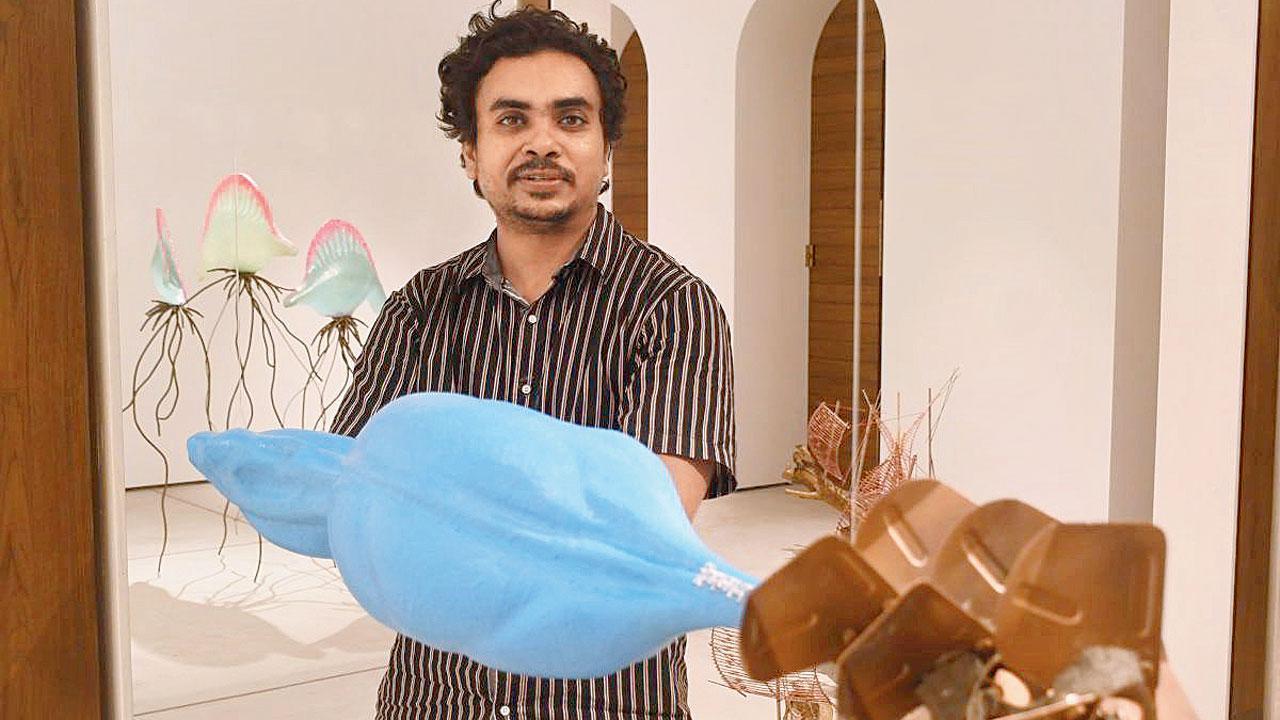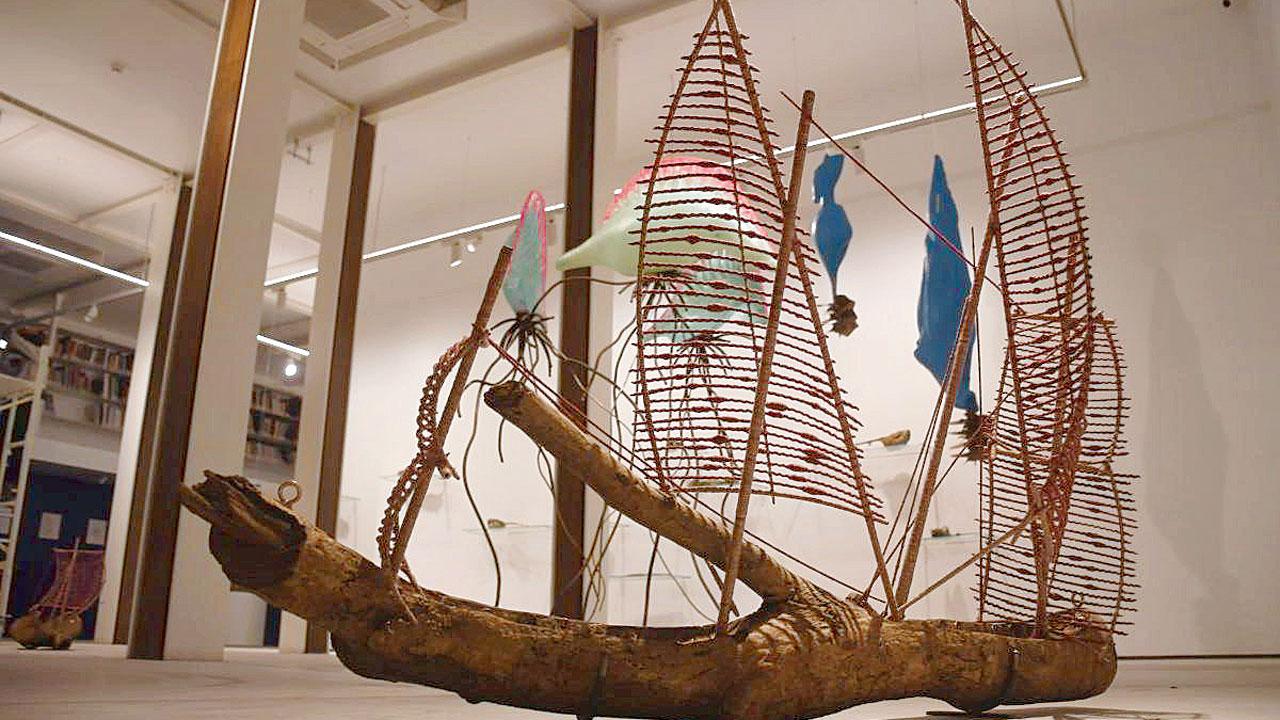A new exhibition of sculptures in south Mumbai are showing us the past and present, though the eyes of the Kolis

Artist Parag Tandel aims to map his heritage through his art forms, currently on display at the Tarq art gallery in Fort. Pics/Ashish Raje
Growing up in Thane’s Chendani Koliwada, artist Parag Tandel’s earliest memories are of playing in the adjoining mangrove forests or swimming around the fishermen’s boats along the coast. After graduating from Sir JJ School of Art, Mumbai, he pursued his further studies at the Faculty of Fine Arts, Baroda, where he was mentored and encouraged to ask questions and develop his creative thinking. “I actually started thinking here,” he laughs, “slowly dismantling the Indian and colonial system of thinking, and finally seeing my Koli community as an art form.”
ADVERTISEMENT
“I’ve seen the cultural richness across my community and family, and the network of kinship between the community and coastal ecosystems, and wanted to document and preserve this—especially after our villages were declared as slums in 2017. I felt it was important to counter the conditioning that had been imbibed in us. Every historical text we read is marred by the perception of a particular writer; so I thought I could, instead, archive my history into these sculptures,” he says, pointing across the exhibit at his show at art gallery Tarq, Fort. “I started documenting the Portuguese and their colonies, and how they converted us to Christianity. They felt we were very, very unsophisticated, when, in fact, we were living very happy content lives.”

Tandel draws from complex traditions of food, fishing and faith
Because the Kolis passed down their knowledge orally through generations, the lack of written scriptures led to historical erasure; even their language is completely forgotten today. Through his work, Tandel presents bodies of sculptures that draw from complex traditions of food, fishing and faith, eschewing imperial modes of recording such as maps and ledgers. He instead creates a distinct form of archiving that resonates with the heritage of his people.
The exhibition opens with an armada of colonial-styled ships, crafted in wood from the Jambul tree, navigating across the floor. “Every Holi, branches of these trees are cut and planted, and we begin our celebrations with a bonfire around it. This custom is very significant to the community,” Tandel says, while pointing out the insides of each ship lined with replicas of Portuguese coins, symbolic of how they blended their customs and culture here rapidly. Beside it is a vividly-hued larger-than-life sized Portuguese man o’ war—a marine jellyfish-like hydrozoan. “I discovered it while archiving. Although this creature is indigenous to our waters, it bears a foreign name, is a threat to the other fishes’ existence, and stinks! Really stinks!” he says, making a jab at its colonial reference.
Looking back at the community’s history, the show’s curator, Shaunak Mahbubani, points out that Tandel is also keenly interested in fostering new possibilities. “With Into The Bones, he uniquely collaborates with metalwork artists from Bastar in Chhattisgarh, melding indigenous artistic techniques from the two regions to develop a series of 12 intricate mixed media sculptures. Calling out to the next generation, the show culminates with an assembly of ecstatic thread sculptures—Talisman For Coastal Futures—that combine the traditional armatures of the Koli faith with the dynamic energy of the ocean and all its inhabitants, casting spells of protection for inter-species coastal futures,” says Mahbubani.
And, since food makes for the fabric of a community, alongside this body of work, Tandel presents a limited-edition publication—Ek Bagal Mein Chand Hoga Ek Bagal Mein Rotiyan—where we are introduced to recipes collected from Koli kitchens and their food culture, which is currently under threat due to rapid urbanisation and oceanic pollution.
“You’re not seeing records or statistics or dates…but rather, the archive is very affectual. It relies on a horizontal form of archiving that the Caribbean philosopher Édouard Glissant called archipelagic thinking, which is thinking through multiple networks. Instead of thinking of a taxonomy, it is thinking outwards in relation to different forms of kinship, with multiple histories existing at the same time. From this perspective, we can learn an alternative form of remembering history and future, because we often forget that Bombay was once an archipelago of seven islands with layers of culture and communities,” laments Mahbubani.
WHAT: Parag Tandel: Archipelagic Archivist
WHERE: TARQ, KK (Navsari) Chambers, ground floor, 39B AK Nayak Marg, Fort
WHEN: Till September 30 from 11 AM to 6:30 PM between Tuesday to Saturday
CONTACT: 6615 0424
 Subscribe today by clicking the link and stay updated with the latest news!" Click here!
Subscribe today by clicking the link and stay updated with the latest news!" Click here!







